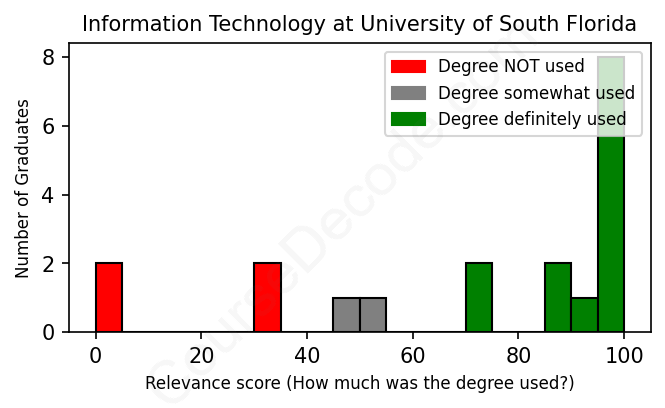
First, some facts. Of the Information Technology graduates from University of South Florida we've analyzed , here's how many have used (or NOT used) their degree in their career:

These are estimates based on AI analysis of 19 LinkedIn profiles (see below).
The verdict? Slightly above average. Overall, with an average relevance score of 72%, Information Technology graduates from University of South Florida have a slightly higher likelihood (+5%) of finding work in this field compared to the average graduate across all fields:
And for comparison, here's the chart for all profiles we've looked at across all degrees.
Also, after graduating, only 10% of these graduates have pursued further education other than another Bachelor's degree (such as a Masters degree or other), compared to the average across all profiles of 35%. This suggests a Bachelors degree is enough for most Information Technology graduates, and it's normal to look for work straight after graduation.
See the details:
|
Relevance score: 98% We think this person has gone into a career highly relevant to their degree. We think this person has gone into a career highly relevant to their degree.
DEGREE INFOGraduated in 2020 from University of South Florida with a Bachelor's degree in Information Technology. No other secondary education since. JOB HISTORY SINCE GRADUATIONEV Tech Specialist Supervisor of Elections Jul 2020 - Aug 2020 Technical Support Specialist I  Inovalon Nov 2020 - Jan 2022 Technical Product Support Analyst II  Inovalon Jan 2022 - May 2023 Application Support Analyst  Inovalon May 2023 - Present ABOUTDriven and hardworking USF graduate who is eager to learn and able to work independently as well aswork cohesively within a group. Strong attention to detail, communication, and time management skills toefficiently achieve goals. Have experience with c#, c++, PHP, python, and SQL. |
The top 10 most common jobs done by the graduates we've analyzed (ranked most common to least) are:
When analyzing the types of jobs held by graduates with a degree in Information Technology from the University of South Florida, it's clear that there are a mix of roles. Many of them found positions that directly relate to IT, such as Software Engineers, System Analysts, and Test Automation Engineers. These positions typically involve core IT skills, including software development, system management, and data analysis—areas where the education they received truly comes into play. On the other hand, there are also graduates who ended up in roles that don't relate much to their degree, like managerial positions in the retail or service sectors, which focus more on operations and less on technology.
Overall, while a good number of graduates managed to land jobs that are well-aligned with their education in Information Technology, there seems to be a significant portion that ventured into areas that don't utilize those skills fully. Positions such as general managers or helpdesk technicians may touch on IT principles, but they don't require the in-depth technical expertise that an IT degree provides. It’s a mixed bag, and while many graduates are putting their IT knowledge to good use, others may find themselves in roles that don't leverage their full potential in the tech field.
Here is a visual representation of the most common words in job titles for Information Technology graduates (this is across all Information Technology graduates we've analyzed, not just those who went to University of South Florida):

It looks like graduates from the University of South Florida (USF) with a degree in Information Technology generally find themselves on solid career trajectories. For many, their first job after graduation often involves positions like help desk support, QA analysts, or various analyst roles, which are great entry points into the tech world. Over the years, these individuals tend to level up into more specialized roles. For example, a good number of alumni move into software engineering, data analysis, and system administration positions, indicating they are gaining valuable experience and technical skills relevant to their degrees.
Fast forward 5 to 10 years, and it seems like many of these graduates are enjoying successful careers within the tech industry, continuing to work for reputable companies like Lockheed Martin and the National Security Agency. While a few have diverged into unrelated fields, the majority are sticking to IT-related careers and progressing in roles such as developers, system analysts, and even managerial positions. Overall, the evidence suggests that USF IT grads have a solid chance at building rewarding careers aligned with their education, which is definitely encouraging for anyone considering a similar path!
Getting a Bachelor’s degree in Information Technology at the University of South Florida, or really any school, can be a mixed bag—it’s definitely not a walk in the park, but it’s not the most brutal option either. You’ll dive into topics like programming, databases, and networking, and you might get your hands dirty with some real-world projects, which can be super engaging. If you’ve got a good grasp of math and a genuine interest in tech, you’ll likely find the material manageable. However, those who struggle with abstract concepts or just don’t vibe with computers might find it a bit more challenging. Overall, it’s probably about average in terms of difficulty—it'll require effort, but if you're passionate about it, you’ll likely enjoy the journey!
Most commonly, in the LinkedIn profiles we've looked at, it takes people 4 years to finish a Bachelor degree in Information Technology.
Looking at these graduates from the University of South Florida, it seems like a mixed bag when it comes to their earnings and career paths. Some have definitely landed solid gigs in tech, like the Software Engineers and Analysts, likely pulling in good salaries, especially if they’re at big companies like Lockheed Martin or the NSA. Others, like the Helpdesk Technicians and different roles in management at eyewear stores, might not be raking in the big bucks as much, but they still have decent jobs. Those working in government roles, such as police officers, typically have stable salaries with benefits, too. Overall, while some are cruising into well-paying positions, others seem to be on the steady grind, which is pretty common in the tech field—initial roles can be a bit modest, but the potential to earn more as you gain experience is definitely there.
Here is a visual representation of the most common words seen in the "about" section of LinkedIn profiles who have a Bachelor degree in Information Technology (this is across all Information Technology graduates we've analyzed, not just those who went to University of South Florida). This may or may not be useful:

Here are all colleges offering a Bachelor degree in Information Technology (ordered by the average relevance score of their Information Technology graduates, best to worst) where we have analyzed at least 10 of their graduates: